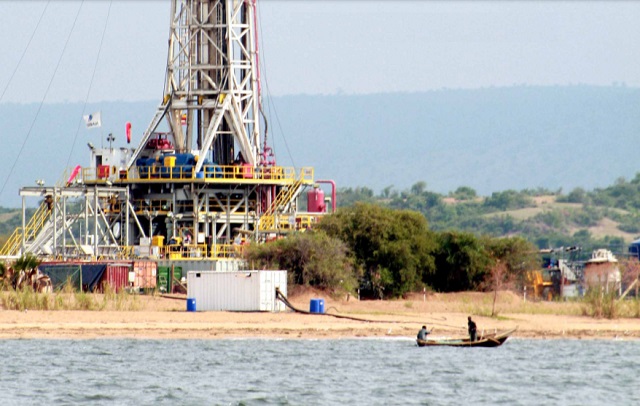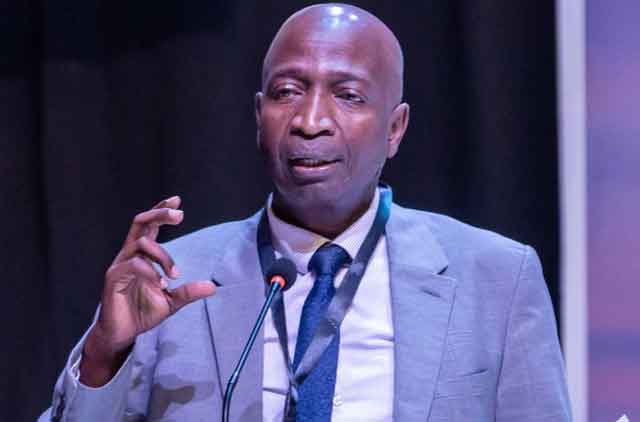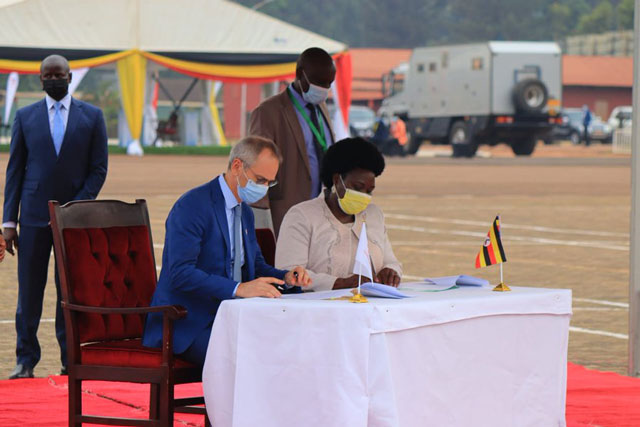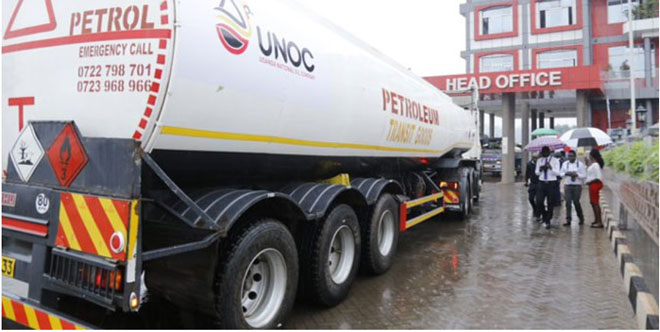
Kampala, Uganda | THE INDEPENDENT | Following the Final Investment Decision, the commencement of field development, and the arrival of the rigs, there is hope that Tilenga and Kingfisher developments in the Albertine will deliver the first oil in 2025.
The joint venture partners, TotalEnergies, China National Offshore Oil Corporation (CNOOC), and Uganda National Oil Company (UNOC), announced a final investment decision (FID) at the beginning of February marking a major step in the country’s oil sector.
The FID covered the Kingfisher and the Tilenga development projects (Upstream) and the crude oil export pipeline or East African Crude Oil Pipeline (EACOP). Some of the players in the sector had expressed their frustration with the slow pace of developments from 2006 when commercial quantities of oil were discovered in the Albertine.
The sector has been characterized by long negotiations, tax disputes with companies like Tullow, and the COVID-19 pandemic. There has been a shift in dates set for the first oil from 2009, to now 2025.
The Director of Petroleum at the Energy Ministry, Honey Malinga told URN that the FID had what he described as a “trigger effect” leading to a beehive of activities in the Tilenga and Kingfisher areas.
“The final investment decision was a key achievement for the three projects. From EACOP, Tilenga, and the Kingfisher. So we started on a good note though in September we had issues with the EU resolution. But generally, the year has been good for the industry,” said Malinga.
Earlier this year, PAU’s Executive Director, Ernest Rubondo told journalists that 2022 was going to commence the period of three years of intense infrastructure development in preparation for the first oil in 2025.
Rubondo had predicted that investments in the sector were likely to shoot to $3 billion compared to $230 million in 2019, $180 million in 2020, and $500 million in 2021.
Investments are expected to increase to about US $3 billion in 2022. The Authority had indicated that contracts that were to be awarded in 2022 were estimated at $6 billion. The Petroleum Authority has estimated that between $15-20 billion will be invested during the development phase of the oil sector.
“Ugandans need to get excited and prepare for what is coming ahead, and the transformation it is already bringing,” said Rubondo.
Rubondo suggested that 40% of the $15-20 billion to be invested during the development phase will be retained through national content. A number of Ugandan suppliers were already partaking part of that pie, said Emmanuel Mugarura, CEO the Association of Uganda Oil and GasService Providers (AUGOS)
“Yes, people are getting money. Unfortunately, most of the money is not being kept here. Most of the money is going to other countries. Why? I don’t know outside countries. But mainly because other people seem to be more prepared than we are,” said Mugarura.

Researchers from the Economic Policy Research Centre (EPRC) working on a study to identify linkages between the agriculture sector and the oil and gas sector in July found that the influx of people in the Albertine region had led to a shortage of supply of meat, vegetables, and milk in the Albertine.
“If you consider the core oil districts and spillover districts, you find that the rate at which demand is growing is faster in the core districts than the spillover districts,” explained Moses Odonkonyero, the research lead.
Developments at CNOOC’s Kingfisher and TotalEnergies Tilenga
The conclusion of the key agreements towards the end of 2021, the enactment of laws on taxes and taxation, and the FID propelled the industry to procurement and contracting.
Contracts for the preparation of the Kingfisher and Tilenga industrial areas were awarded to Excel Construction and Mota-Engil Uganda respectively.
As the year ends, sources told URN about 90% of the work had been completed by Mota-Engil Uganda. Facilities to be hosted in the industrial area for Tilenga include the Central Processing Facility(CPF), construction camps, and drilling and operational support bases among others.
At the end of 2021, preparation of the site at the Tilenga area was estimated at about 30% but a source at TotalEnergies told URN the contracted companies were in the advanced stages of the work.
Mota-Engil Uganda had by early this year commenced preparation of the site for the Central Processing Facility.
Mota-Engil Uganda also won the contract for the construction of 31 well pads on which the wells for the Tilenga project will be drilled. According to the plans, drilling at the Tilenga project should have commenced during the last quarter of 2022.
Drilling companies for the North-Nile pad in the jobi-rii area were already on the ground.
Kingfisher Development under CNOOC
URN has been visiting the Kingfisher project where China’s Offshore Oil Engineering Company, and partners are developing the Mputa, Nzizi and Waraga fields. Kingfisher will host a Central Processing Facility (CPF) with a capacity of 40,000 barrels of oil per day.

There will also be thirty-one wells to be drilled on four well pads. With FID, the Buhuka area along Lake Albert shores has greatly changed with a number of visible from February to date.
The well pads, and in-field access roads are being constructed by Excel Limited. Three well pads are to be constructed in the Kingfisher development by Excel Construction limited. The contract to design and construct a permanent camp, supply base, and safety and security check was awarded to China State Construction Engineering Corporation.
CNOOC Uganda, the operator of the Kingfisher project had by early December erected a rig, on the western part of Lake Albert. Energy and Mineral Development Minister, Ruth Nankabirwa visited the project in mid-November to assess the progress.
President Museveni was scheduled to flag off drilling at the Kingfisher on December 20th, 2022, but the event was called off. Sources indicate that the change of date was due to pending work on the waste management facility for drill cutting.
The drilling waste treatment and disposal facility at Kingfisher is to be run by Luwero Industries, a subsidiary of National Enterprise Corporation (NEC), the commercial arm of the ministry of defense/UPDF.
The UPDF is partnering with a Chinese firm HBP. Sources told URN that while Luwero Industries has already been established on the ground with a camp to house 150 people, the facility which should have equally been commissioned by the President still had some issues related to the power supply.
Former Deputy IGP, now General Manager of Luwero Industries, Major General Muzeeyi Sabiiti was at Kingfisher on November 30th to check on the progress and to ensure compliance with environmental requirements before drilling starts.
2022 was one of the most tumultuous years for the East Africa Crude Oil Pipeline (EACOP). While Uganda and Tanzania were determined to move with the project, 2022 saw an intensification of campaigns against it by anti-fossil campaigners targeting insurance firms, and banks among others. The campaigners in September secured an EU Parliament’s urging for the delay of EACOP.
The efforts had tried to stop financing for the development of EACOP, whose estimated cost is between $3.5 billion to $5 billion. PAU Director Support Services, Penina Aheebwa in September defended EACOP saying those fighting its development were against the development of Uganda.
“They should be aware of the value of over US$ 81 billion (almost double Uganda’s current GDP) at stake from Uganda’s oil and gas projects. Additionally, the perceived environmental impacts have been fully addressed through the established of Environmental and Social assessment (ESIA) processes to the highest international standards,” said Aheebwa in a statement.
Ruth Nankabirwa, and her State Minister, Okasai Opolot have been at global fora including COP27 to defend EACOP and the developments in the Albertine. Despite the negative campaigns, there were signals that the project’s construction could take off in 2023.
During the year, the EACOP got some funding totaling $300 million from alternative lenders like the Islamic Development Bank and $200 million from the Afrieximbank. In October, Afreximbank chairman, Prof Benedict Oramah, and his executive team said financing EACOP and the refinery in Uganda was a strategic business that will uplift African economies’ armory to fight poverty.

In July, the East African Pipeline Crude Oil Company(EACOP) Ltd General Manager, Martin Tiffen applied for a construction permit from Uganda and Tanzania. The Ministry of Energy was yet to grant the permit by the time of filing this report.
Petroleum Director, Honey Malinga told URN that while no objection had been received from the public, the ministry was in final stages of the exercise to ensure compliance with Environmental, Social, and Governance.
“The law says 106 days. So we expect a decision late this month or early next year. Because I think there are some conditions that they never fulfilled at the beginning. They were supposed to make the application with payment but they didn’t,” said Malinga
Section 12 of the Petroleum (refining, conversion Transmission, and storage) Act requires the government to carry out public hearings on such projects before a decision is taken on whether to allow the construction.
The notice in the case of Uganda was in relation to about 296 kilometers of the pipeline on the Uganda side starting from Kabale in Hoima up to Mutukula border with Tanzania.
Exploration Uganda’s petroleum resources remain at 6.5 billion barrels in place with about 1.4 billion barrels as recoverable. No more discoveries were reported.
“These resources, much as they look very small compared to the large producers, are a very good beginning for the country. Because they will enable the production of 200,000 barrels of crude oil per day for the country. And it is important to note that these resources are in only 15% of Albertine Graben which is currently licensed” said Rubondo.
According to Rubondo, there is potential for more oil to be discovered in 2023 from the ongoing exploration being undertaken by Oranto Petroleum and Australia’s Armour Energy in the Ngasa and Kanywataba contracts.
Meanwhile, the Ministry of Energy was yet to complete the licensing of additional areas for exploration. The second licensing round that was partly affected by the COVID-19 pandemic has dragged on since 2019 when the ministry invited bidders.
URN has learned that while the Ministry had zeroed in on two successful companies which included Uganda National Oil Company(UNOC), the cabinet was yet to endorse the deal.
“The Minister has to let the cabinet know about the process before we sign. So we have two companies waiting for us to get a green light from the cabinet before we can award the licenses,” revealed Malinga. The two companies include Uganda National Oil Company UNOC and DGR Global.
One of the lows of the sector has been the delay of an FID for the Kabaale Refinery project which had been expected by early February 2022. The 60,000 barrels per day (BPD) oil refinery was supposed to be connected to Kampala by pipeline to cater to the local supply market of diesel and gasoline.
At the end of the US-Africa Leader’s summit, there were reports by the State House that Albertine Graben Refinery Consortium (AGRC) has reached an agreement on capital investments.
Government in April 2018, signed a Project Framework Agreement (PFA) with the Albertine Graben Energy Consortium (AGEC), for the design, financing, construction, and operation of a 60,000 refinery in Hoima, Uganda. The AGEC contracted SAIPEM S.p.A to undertake a Front-End Engineering Design (FEED) for the project.
*****
URN
 The Independent Uganda: You get the Truth we Pay the Price
The Independent Uganda: You get the Truth we Pay the Price



